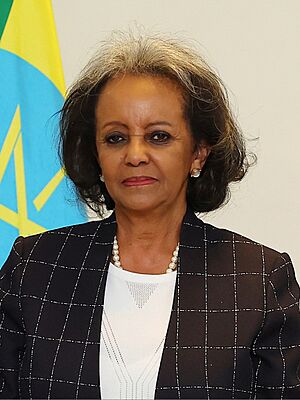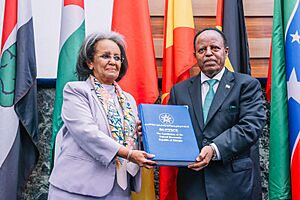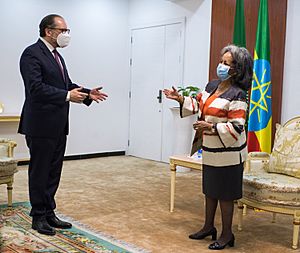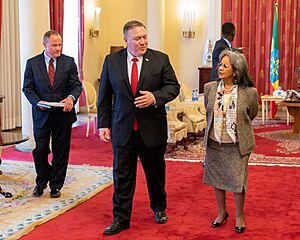Sahle-Work Zewde facts for kids
Quick facts for kids
Sahle-Work Zewde
|
|
|---|---|
|
ሣህለ ወርቅ ዘውዴ
|
|

Sahle-Work in 2022
|
|
| President of Ethiopia | |
| In office 25 October 2018 – 7 October 2024 |
|
| Prime Minister | Abiy Ahmed |
| Preceded by | Mulatu Teshome |
| Succeeded by | Taye Atske Selassie |
| Under Secretary-General, Head of the United Nations Office to the African Union | |
| In office 27 June 2018 – 25 October 2018 |
|
| Appointed by | António Guterres |
| Preceded by | Haile Menkerios |
| Succeeded by | Hanna Tetteh |
| Director-General of the United Nations Office at Nairobi | |
| In office 2011–2018 |
|
| Appointed by | Ban Ki-moon António Guterres |
| Preceded by | Achim Steiner |
| Succeeded by | Hanna Tetteh |
| Ambassador to Senegal with accreditation to Mali, Cape Verde, Guinea-Bissau, Gambia and Guinea | |
| In office 1989–1993 |
|
| President | Mengistu Haile-Mariam Tesfaye Gebre Kidan Meles Zenawi |
| Personal details | |
| Born | 21 February 1950 Addis Ababa, Ethiopian Empire |
| Political party | Independent |
| Education | University of Montpellier |
Sahle-Work Zewde (born February 21, 1950) is an Ethiopian diplomat. She served as the president of Ethiopia from 2018 to 2024. She was the first woman to hold this important office in Ethiopia's history.
Sahle-Work was chosen as president by the members of the Federal Parliamentary Assembly on October 25, 2018. She was elected unanimously, meaning everyone agreed. The business magazine Forbes once listed her as one of the world's most powerful women. She was the highest-ranking African woman on that list.
Contents
Early Life and Education
Sahle-Work Zewde was born in Addis Ababa, the capital city of Ethiopia. She is from the Amhara ethnic group. She was the first of four children in her family.
She went to primary and secondary school at Lycée Guebre-Mariam in Addis Ababa. After that, she moved to France to study natural science at the University of Montpellier. Sahle-Work is very good with languages. She can speak Amharic, French, and English fluently.
A Career in Diplomacy
Sahle-Work Zewde had a long and successful career as a diplomat. A diplomat is someone who represents their country in other nations. She was only the second woman in Ethiopia's history to become an ambassador.
Serving as Ambassador
From 1989 to 1993, Sahle-Work was Ethiopia's Ambassador to Senegal. She also represented Ethiopia in several other West African countries, including Mali and Guinea.
Later, from 1993 to 2002, she served as Ambassador to Djibouti. Djibouti is a very important country for Ethiopia because it provides access to the sea for trade. Her work there helped her gain experience in international trade.
From 2002 to 2006, she was Ambassador to France. During this time, she also represented Ethiopia at United Nations Educational, Scientific and Cultural Organization (UNESCO). She was also accredited to Tunisia and Morocco.
Sahle-Work also held other high-level positions. She was Ethiopia's Permanent Representative to the African Union. She also worked as the Director-General for African Affairs in Ethiopia's Ministry of Foreign Affairs.
Working with the United Nations
Sahle-Work Zewde also had a distinguished career with the United Nations. The UN is an international organization that works for peace and cooperation.

Until 2011, she was a Special Representative for the UN Secretary-General. She led the UN office that worked for peace in the Central African Republic.
In 2011, she became the Director-General of the United Nations Office at Nairobi (UNON). Under her leadership, the Nairobi office became a more important UN center for East and Central Africa.
In June 2018, the UN Secretary-General, António Guterres, appointed her as his Special Representative to the African Union. She was also the head of the UN Office to the African Union. She was the first woman to hold this specific role.
President of Ethiopia
On October 24, 2018, the then-president of Ethiopia, Mulatu Teshome, suddenly resigned. Prime Minister Abiy Ahmed chose Sahle-Work Zewde to be the next president.

Her appointment was part of Prime Minister Abiy's efforts to have more women in important government roles. He believed this would help reduce unfair treatment in society. The Federal Parliamentary Assembly approved her appointment unanimously on October 25, 2018.
Sahle-Work was the first woman to serve as president of Ethiopia. She was the fourth president since the Federal Democratic Republic of Ethiopia was established in 1995. Her term as president ended on October 7, 2024.
The president's role in Ethiopia is mostly ceremonial. This means the prime minister holds most of the executive power. However, Sahle-Work's election was still very significant. She was Ethiopia's first female head of state since Empress Zewditu many years ago. During her time in office, she was one of only a few female heads of state in Africa.
In March 2020, Sahle-Work announced that she had pardoned (released) over 4,000 prisoners. This decision was made to help stop the spread of the COVID-19 pandemic in Ethiopia in prisons. She pardoned more prisoners in April 2020.

In December 2020, Sahle-Work changed the death sentences of two former government officials to life imprisonment. These officials had been living in the Italian embassy since 1991.
Sahle-Work also spoke about the Tigray War. She called for the conflict to end through "negotiations without any conditions." She also supported necessary actions to counter attacks.
See also
 In Spanish: Sahle-Work Zewde para niños
In Spanish: Sahle-Work Zewde para niños
 | James Van Der Zee |
 | Alma Thomas |
 | Ellis Wilson |
 | Margaret Taylor-Burroughs |



